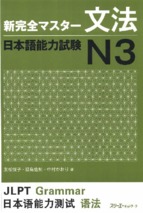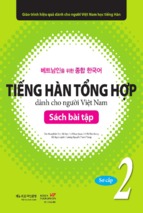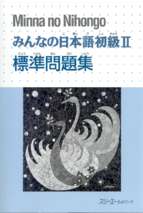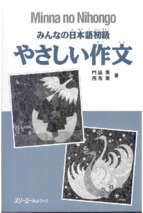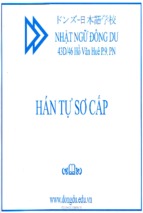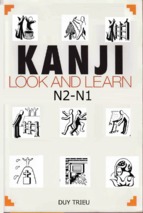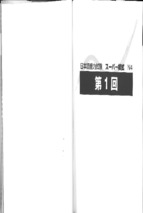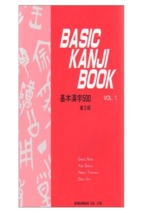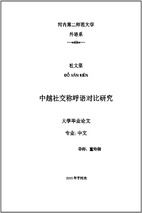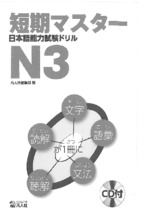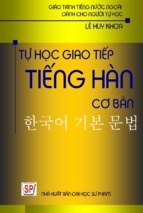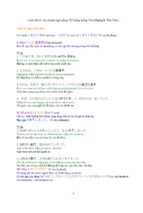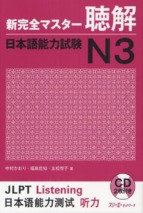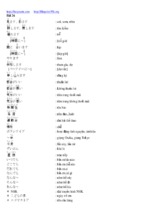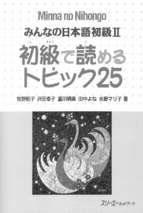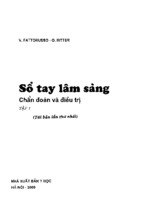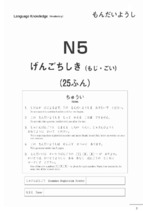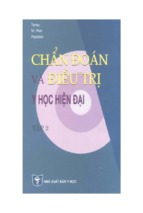Mô tả:
HOWDY
JAPANESE
CHIWASSU NIHONGO
ちわつす日本語
…Hello
konnichiwa
こんにちは
Japanese slang isn’t really used with strangers, so there aren’t a lot of meet-and-greet-type slang words. If you’re being introduced to somebody for the very first time, you gotta suck it up and settle for a good old-fashioned konnichiwa. But when youVe rolling with friends, MhelloM will come off a little stiff, so try slinging one of the following slang various 门 s 〇门 /conn/c/i/vvs:
Hi
koncha こんちや
Howdy
chiwassu ちわっす
Howdy-ho
konchassu
こんちやつす
Howdy-do
nchatt
んちゃつ
What’s up?
ossu
おっす
A slangier way of saying Mhellow would be ossu. Like its English counterpart “what’s up,” ossa has an infinite number of variations. Ossu was originally an incredibly formal word, the kind of thing that a soldier would say to a drill sergeant— like: MSIR YES SIR!n But in a slang context, ossu comes across as a silly way to say “hi.” Here’s how two Triends might greet each other, for example:
Whattup! (greeting) ossu
おっす!
‘Sup. (response) ussu
ぅっす。 or
Whazzap! (greeting) uissu
ういつす一!
Whazzaaaaaaap!!! (response) ussussu
うつすつす!
Good morning / Good evening
ohayo/ kombanwa
おはよう•こんばんは
There are also informal variations on “good morning” and “good evening”:
Good morning, Sunshine!
おつは一
G’morning!
ohayon
おはよ_ん
Evenin*
konbancha
こんばんちや
Long time no see
ohisashiburi
おひさしぶり
As in English, the next part of a greeting usually involves inquiring about the other person’s well-being.
しong time no see!
ohisa
おひさ!
How’s it hanging?
choshi doyo?
調子どうよ?
It’s hanging.
bochibochi denna
ぼちぼちでんな。
How you been?
ogenko?
おげんこ?
Same as always, man.
ai kawarazu dayo
相変わらずだよ。
And just as fat as always.
ai kawarazu debu dashi
相変わらずデブだし。
And you’re just as retarded as always.
omae wa ai kawarazu aho dashi
お前は変わらずアホだし。
Yo, guys!
yo omaera
よ一お前ら!
…-Goodbye
sayonara
さようなら
When it comes to parting phrases, there are also any number of variations on the traditional sayonara.
Buh-bye
bainara
ばいなら
See ya
hon ja ne ほ/^じゃ一ね
Later
mata ne
またね一
Smell you later (tough guy way of saying “bye”) aba yo
あばよ
Hey!
oi!
おい!
In British English, “oi” is a slightly impolite word used to get peopled attention. In Japanese, oi is a slightly impolite word used to get people’s attention. Go figure. Other attention grabbers:
Look!
hora
ほら!
Hey, kid...
na kimi
な\ 〇 O
Come here a sec.
chotto oide
ちょっとおいで。
I want to have a word with you.
hanashi ga arundakedo
話があるんだけど。
Myself
jibun
自分
One of the great things about Japanese is the variety of personal pronouns you can assume. The main three ways to say T are:
I (feminine/polite) watashi
私
I’m Nancy!
watashi wa nanshi desu
私はナンシーで一す。
I (boyish) boku
僕
Tm studying as hard as I can to get into college! boku wa issho kemmei juken benkyo o yatte masu
俺は一生けんめい受験勉強をやってま一す。
I (manly) ore
I totally look like Mel Gibson,don’t I? ore tte meru gibuson ni nitene
俺って、メルギブソンに似てねえ?
Of course, there are also numerous slang ways to say “1,” most of which are variations on the aforementioned pronouns. Kids use all of these with different levels of irony, but nobody \ust sticks to one pronoun. Especially girls—they can use male pronouns without any innuendo, though a dude’s use of a female pronoun will probably be construed as super gay.
I (male, redneck) ora
おら
I don’t know how to use them microwaves, ora denshi renji no tsukaikata nanka wakanne
おら、電子レンジの使い方なんかわかんね一。
I (male, dopey) oira
おいら
I went to New 丫ork, but I didn’t see no big apples, oira nyuyoku ni ittakedo okina ringo nanka minakatta ze
おいら、NYに行ったけど、大きなリンゴなん か見なかったぜ。
I (female, slightly Valley Girl) atashi
あたし
Oh my god, I have no idea what I did all day! uwa atashi kyo ichinichi nani yatteita ka wakannai no
うわ、あたし、今日一日何やっていたかわかん ないの!
I (female, rich girl) atai
あたい
I always take taxis because I can’t stand trains.
atai densha wa iya dakara itsumo takushl o tsukatte iru noyo
あたい、電車は嫌だからいつもタクシーを使って いるのよ。
I (male, geezer) asshi
あっし
You know, I used to be quite the ladies* man, back in the day. asshi wa mukashi kanari no iro otoko datta ze
あっしは昔、かなりの色男だったぜ。
Sorry
gomen nasai
ごめんなさい
Apologizing is a really just a matter of sincerity. If you truly regret your actions, just say so in a straigntforward and honest manner. But if you just don’t give a fuck, try apologizing with one of the following variations on gomennasai:
Sorry, Charlie
gomenchai
ごめんちゃい
Ex-squeeze me
gomenkusai
ごめんくさい
Whoopsy-daisy
mengo mengo
めんごめんご
DIRTY
TIẾNG NHẬT
Tiếng Nhật
“What,s Up?” đến “F* 系# Of f!”
1
Nội Dung
Sử dụng sách này
1
[1]Chào hỏi
[3] Tiệc tùng
5
21
38
[4] Cơ thể
57
[5] Horny Japanese
73
[6] Giận dữ
91
[7] Poppy Japanese
103
[8] Sporty Japanese
[9] Hungry Japanese
120
130
About the Author
150
[2] Friendly Japanese
2
HOWDY
JAPANESE
CHIWASSU NIHONGO
ちちちちちちち
…Hello
konnichiwa
ちちちちち
Japanese slang isn’t really used with strangers, so
there aren’t a lot of meet-and-greet-type slang
words. If you’re being introduced to somebody for the
very first time, you gotta suck it up and settle for a
good old-fashioned konnichiwa. But when youVe rolling
with friends, MhelloM will come off a little stiff, so try
slinging one of the following slang various ち s ち ち
/conn/c/i/vvs:
Hi
koncha ちちちち
Howdy
chiwassu ちちちち
Howdy-ho
konchassu
ちちちちちち
Howdy-do
nchatt
ちちちち
....What’s up?
ossu
ちちち
A slangier way of saying Mhellow would be ossu. Like its English counterpart “what’s
up,” ossa has an infinite number of variations. Ossu was originally an incredibly
formal word, the kind of thing that a soldier would say to a drill sergeant— like:
M
SIR YES SIR!n But in a slang context, ossu comes across as a silly way to say “hi.”
Here’s how two Triends might greet each other, for example:
Whattup! (greeting) ossu
ちちちち
‘Sup. (response) ussu
ちちちち
or
Whazzap! (greeting) uissu
うちちちちち
Whazzaaaaaaap!!! (response) ussussu
うちちちちち
....Good morning / Good evening
ohayo/ kombanwa
ちちちう•ちちちちち
There are also informal variations on “good morning” and “good evening ”ち
Good morning, Sunshine!
ちちちち
G’morning!
ohayon
ちちち_ち
Evenin*
konbancha
ちちちちちち
....Long time no see
ohisashiburi
ちちちちちち
As in English, the next part of a greeting usually involves inquiring about the other
person’s well-being.
系 ong time no see!
ohisa
ちちちち
How’s it hanging?
choshi doyo?
ちちちうちち
It’s hanging.
bochibochi denna
ちちちちちちちち
How you been?
ogenko?
ちちちちち
Same as always, man.
ai kawarazu dayo
ちちちちちちちち
And just as fat as always.
ai kawarazu debu dashi
ちちちちちちちちちち
And you’re just as retarded as always.
omae wa ai kawarazu aho dashi
ちちちちちちちちちちちち
Yo, guys!
yo omaera
ちちちちちち
Hey.
ya
ちち!
It’s been a
while.
hisa bisa dana
ちちちちち
What’s the
word?
saikin doyo?
ちちちうちち
Same old bullshit.
aomokomo neyo
ちうちちちちちちち
う
…-Goodbye
sayonara
ちちうちち
When it comes to parting phrases, there are also any
number of variations on the traditional sayonara.
Buh-bye
bainara
ちちちち
See ya
hon ja ne ち/^ちち
ちち
Later
mata ne
ちちちち
Smell you later (tough guy way of saying
“bye”ち aba yo
ちちち
....Hey!
oi!
ちちち
In British English, “oi” is a slightly impolite word used to
get peopled attention. In Japanese, oi is a slightly
impolite word used to get people’s attention. Go figure.
Other attention grabbers:
Look!
hora
ちちち
Hey, kid...
na kimi
ち\ ち
O
Come here a sec.
chotto oide
ちちちちちちちち
I want to have a word with you.
hanashi ga arundakedo
ちちちちちちちちち
....Myself
jibun
ちち
One of the great things about Japanese is the variety of
personal pronouns you can assume. The main three ways
to say T are:
I (feminine/polite) watashi
ち
I’m Nancy!
watashi wa nanshi desu
ちちちちちちちちちち
I (boyish) boku
ち
Tm studying as hard as I can to get into college! boku
wa issho kemmei juken benkyo o yatte masu
ちちちちちちちちちちちちちちちちちちちち
I (manly) ore
I totally look like Mel Gibsonちdon’t I? ore tte meru
gibuson ni nitene
ちちちちちちちちちちちちちちちち
Of course, there are also numerous slang ways to say “1 ち” most of which are
variations on the aforementioned pronouns. Kids use all of these with different levels
of irony, but nobody \ust sticks to one pronoun. Especially girls—they can use male
pronouns without any innuendo, though a dude’s use of a female pronoun will
probably be construed as super gay.
I (male, redneck) ora
ちち
I don’t know how to use them microwaves, ora denshi renji no tsukaikata nanka wakanne
ちちちちちちちちちちちちちちちちちちちちち
I (male, dopey) oira
ちちち
I went to New ち ork, but I didn’t see no big apples, oira nyuyoku ni ittakedo okina ringo
nanka minakatta ze
NY ちちちちちちちちちちちちちちち ちちちちちちちち
ちちちち
I (female, slightly Valley Girl) atashi
ちちち
Oh my god, I have no idea what I did all day! uwa atashi kyo ichinichi nani yatteita ka
wakannai no
うちちちちちちちちちちちちちちちちちちちち ちちちち
I (female, rich girl) atai
ちちち
I always take taxis because I can’t stand trains.
atai densha wa iya dakara itsumo takushl o tsukatte iru noyo
ちちちちちちちちちちちちちちちちちちちちちち ちちちちち
I (male, geezer) asshi
ちちち
You know, I used to be quite the ladies* man, back in
the day. asshi wa mukashi kanari no iro otoko datta ze
ちちちちちちちちちちちちちちちちち
....Sorry
gomen nasai
ちちちちちち
Apologizing is a really just a matter of sincerity. If you
truly regret your actions, just say so in a
straigntforward and honest manner. But if you just
don’t give a fuck, try apologizing with one of the
following variations on gomennasai:
Sorry, Charlie
gomenchai
ちちちちちち
Ex-squeeze me
gomenkusai
ちちちちちち
Whoopsy-daisy
mengo mengo
ちちちちちち
....Excuse me
sumimasen
ちちちちち
“Excuse me” is one of those multipurpose words that
can be a greeting, a good-bye, or an apology for
farting. The same goes for Japanese—you can use
these slang variations of “excuse me” in a variety of
situations.
1^ CDirdy □ち P ちちち s ち
Pardon
suimasen
ちちちちち
Well pardon me for living!
ikitete suimasen
ちちちちちちちちちち
*Scuse me
suman
ちちち
’Scuse my shitty Japanese.
nihongo ga hetakuso de suman
ちちちちちちちちちちちちち
$0rr¥ *
sumaso
ちちち
$0rr¥ I’m late, osoku natte
sumaso
ちちちちちちちちち
ちcomputer speak that went mainstream
Aside from “sorry” and “excuse me,” there are a
couple other slangish ways to shrug off guilt:
pay no mind
donmai
ちちちち
My bad
warine
ちちちちち
Apologies
moshiwake
ちうちちち
You poor thing
kawaiso
ちちちちう
....Please
kudasai
…ちちちち
Asking for a favor is another of those things that you
usually want to be polite about. But when you are
talking to friends, feel free to be a little more casual:
Why don’t you_ • •
…kuri
…ちち
Why don’t you call me sometime.
…kondo denwa shite kuri
ちちちちちちちちち
Purdy-please (archaic, rural)
• ••kunro
…ちちち
Tell me your name, purdy-please! onamae
osete kunro ちちちちちちちちちちち
Pretty-please (feminine)
…cho
…ちち
When you find out where the party is, could you text
me, pretty-please?
nomikai no basho kimattara meru shite cho
ちちちちちちちちちちちちちちちちちちち
Do
"•ち 3
…ち
Go do your best—we Ye all rooting for you. oen
shiterukara gambatte kina ちちちちちちちちちちちちち
ちちち
I4* ciirdy G3Pan ち s ち
Do clean up—I’ve got friends coming over,
tomodachi ga kuru kara soji shina
ちちちちちちちちちちちちち
I hope you…
• • .kureya
…ちちち
I hope you hang out with me a lot. takusan
asonde kureya
ちちちちちちちちちちち
You should…
...okure
…ちちち
You should come kick it at my place
sometime, kondo uchi e asobi ni kite okure
ちちうちちちちちちちちちちち
Snease (a horrible pun)
...chommage
…ちちちちち
Forgive me, snease! yurushite chommage
ちちちちちちちちち
Pleeze (slightly silly)
…kurahai
…ちちちち
Pleeze eat the leftover sushi, osushi nokotta
kara kutte kurahai
ちちちちちちちちちちちちちちちち
(((((iNTRDDUCiNG
yDURSPLP)))))
ちちちち
JIKOSH0KAI
My name's Kenneth, ore
wa kenesu tte iunda ちち
ちちちちちちうちち
Tm from Canada.
kanada kara kiteru
I
only
have
three
months to live, inochi wa
ato
sankagetsu
shika
nainda ちちち 3 ちちちち
ちちちちち
And Tm still a virgin,
mada cheri dashi ちちちちちちちちち
♦++++
My name’s Rebecca, atashi wa rebekka desu ちちちちちちち
ちちちち
I’m from England.
igirisu jin desu
ちちちちちちちち
I’m here looking for adventure, boken o motome koko ni
yatte kita ちちちちちちちちちちちちちち
No man can handle me.
atashi o atsukaeru otoko nanka inai
ちちちちちちちちちちちちちちち
lb □ち rdy 03P ちちちちち
....Let’s be friends
yoroshiku onegai shimasu
ちちちちちちちちちち
Okay, so literally this phrase doesn’t mean “let’s be
friends,” but thafs the best English equivalent I can
offer. (A literal translation would go something like Ml
hope you will take care of things in a manner that is
convenient for both of us.M) When I learned Japanese
as a kid, my teacher gave it the almost as unwieldy
rendering. “Please be kind to our friendship.”
Basically, it’s a word that appeals to someone’s
generosity. You use it after introducing yourself to
someone for the first time, or when you ask a favor of
somebody who’s already your friend. When you say
yoroshiku to a friend, it just means something like “do
me right, baby,” as in the following:
My name’s Francisco.
Please take care of me while Tm here in Japan,
boku wa furanshisuko desu. nihon ni iru aida wa
yoroshiku desu
ちちちちちちちちちちちちちちちちちち ちちちち
ちちち
I don’t know much Japanese, so work with me as
best you can.
nihongo wa amari wakaranai node yoroshiku
ちちちちちちちちちちちちちちちちちちち
In other words, yoroshiku is an all-purpose phrase that
you can use whenever you need to implore
somebody’s altruism. There are also numerous slang
versions of the word:
Take good care of my luggage, now. nimotsu
yoroshiko
ちちちちちちち
That would be awesome if you could hook me up
with a cute guy!
kondo kawai otoko no ko shokai shite, shikoyoro
ちちちちちちちちちちちちちちちちちちち
I’m gonna drop by tomorrow, so…ち don’t ass out on
me) ashita wa asobi ni iku node yoropiko
ちちちちちちちちちちちちちちち
....Nice to meet you
haiimemashite
ちちちちちち
Not to sound like a broken record, but in Japan you
don't use slang with someone you don't know. Which means
that when you are asking somebody how old they are,
where they grew up, or whether they prefer Diet or
regular Dr. Pepper, you probably need to use polite
speech. Here are some basic non-slang icebreakers to
use with new acquaintances.
Nice to meet
you.
hajimemashite
ちちちちちちち
Whafs your name?
onamae nante
iundesuka
ちちちちちちうちちちちち
Have we met before? dokka
de atta koto arimasenka
ちちちちちちちちちちちちちちちち
Do you have a
light? raita
arimasuka
ちちちちちちちちちち
Do you have the
time? jikan
wakarimasuka
ちちちちちちちちち
Thanks. I just wanted to record the exact time I first
met you. arigato. anata ni hajimete atta jikan o
seikaku ni kiroku shite okitakattandesu
ちちちちうちちちちちちちちちちちちちちちち ち
ちちちちちちちちちちちちちち
IQ CDirdSd □ち P3 ちち S ち
Do you come here often? yoku kokoni
kurundesuka
ちちちちちちちちちちちち
Do you want to get a drink? ocha shimasenka
ちちちちちちちち
How old are you? oikutsu desuka
ちちちちちちちち
No waaaay! You don’t look a day older than
twenty!
usso. hatachi nimo mieani noni
うちちち…ち 2 0 ちちちちちちちちちち
How old do you think I look? watashi wa ikutsu
ni miemasuka
ちちちちちちちちちちちち
I’m new to Japan.
watashi wa nihon ni kita bakkari nandesu
ちちちちちちちちちちちちちちちち
I want to make some Japanese friends, nihonjin
no tomodachi o tsukuritain desu
ちちちちちちちちちちちちちちちち
What do you like to do on your days off?
kyujitsu wa itsumo nani shite imasuka
ちちちちちちちちちちちちちち
Teach me some Tun words.
nanika omoshiroi kotoba o oshiete kudasai
ちちちちちちちちちちちちちちちちちちち
Tm enjoying hanging out with you. issho ni
asondete tanoshl desu
ちちちちちちちちちちちちち
....Pictures
shashin
ちち
Let's take a
picture, issho ni
shashin toro
ちちちちちちちうち
You know Japanese folks love their pictures. But when
you take a photo, don’t ask your models to say
"cheese” ち ask them what one plus one is, because
the Japanese word for “two” ち /) pulls the old cheeks
up like a good face-lift:
What’s one plus one?
ichi tasu ichi wa
1 ちち 1 ちち
Two!
ni
ちち…ち
2
0
□irty GBP3flBS ち
- Xem thêm -

